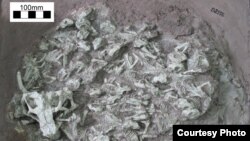Some dinosaurs may have operated nurseries for their hatchlings, according to a new study.
Researchers at the University of Pennsylvania examined a rock slab found in China that contains the fossils of 25 common plant-eating dinosaurs (Psittacosaurus lujiatunensis), that lived between 123 to 100 million years ago.
Twenty-four are very young dinosaurs, one a juvenile; based on the size of the skull.
Paleontology professor Peter Dodson and doctoral student Brandon Hedrick analyzed the material in the less than one-meter-wide rock, and determined it was a volcanic flow that caught and trapped the group.
That close proximity, the researchers say, suggests post-hatchling cooperation, as seen in some modern birds. The juvenile dinosaur could have been an older sibling helping to care for the younger ones.
Hedrick said "it seems like it might be a nest," but he added there is not enough evidence to say it definitely is.
The new study appears in the journal Cretaceous Research.




